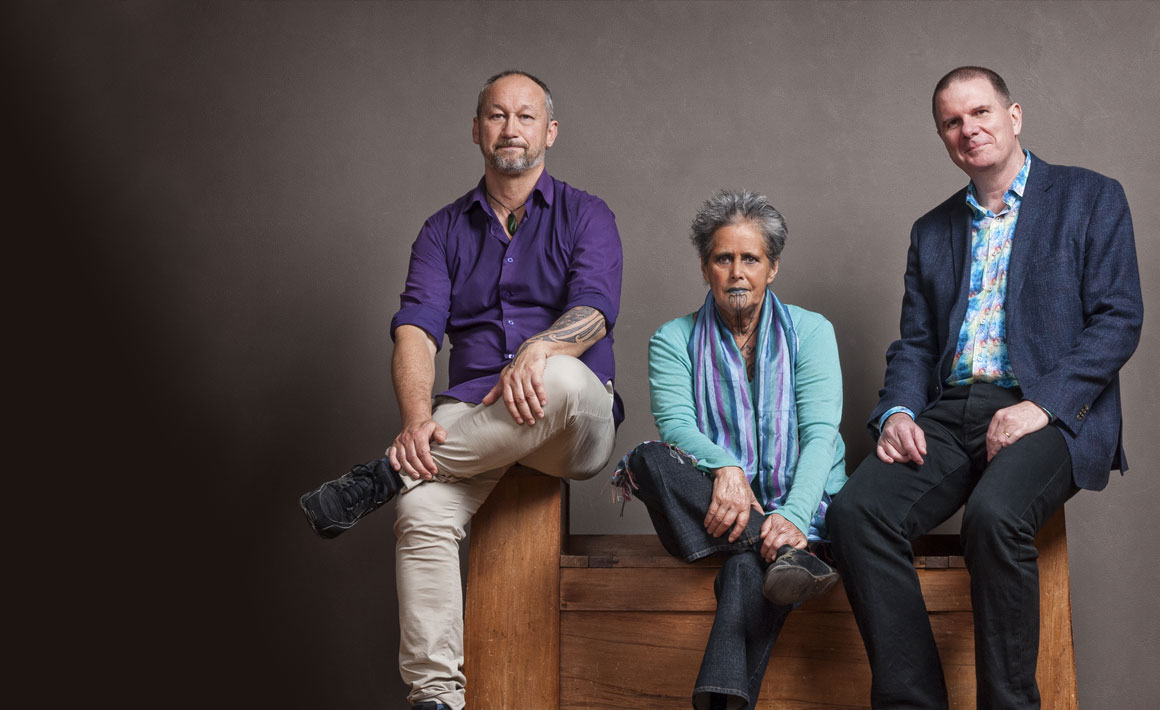 Dr Philip Wilcox, Professor Khyla Russell and Professor Stephen Robertson: “It's clear to us that New Zealanders have to lead the work in identifying and interpreting the genetic variation within the local population.”
Dr Philip Wilcox, Professor Khyla Russell and Professor Stephen Robertson: “It's clear to us that New Zealanders have to lead the work in identifying and interpreting the genetic variation within the local population.”Otago researchers are working to develop a catalogue of New Zealand genomic variation to help address health inequities in this country.
Genomic medicine is beginning to change human health outcomes worldwide, making a difference both at the individual and population levels in diagnosis, prognosis and therapeutics.
But for New Zealand, the challenge is not just to be able to keep up with this fast growing field; it's also to ensure equitable benefits from genomic-based technology. To do that, University of Otago researchers know accurate genomic information from Māori populations will be required.
Genomics is the study of the genome, the complete set of genetic material present in a cell or organism. Genomic medicine draws on understanding variation within the human genome or set of genes that affect health. Some combinations of these variations are unique to individuals due to their ancestral origins.
Current human genomic datasets rely heavily on genetic information from studies on Western European and East Asian populations. Indigenous populations are not well represented; in particular, there is very little detail about specific genetic variations that influence the health and well-being of Māori and Pacific people.
That means precision medicine is geared to benefit some ethnicities more than others – a health inequity in the making.
The need for building accurate Māori genomic information has been clearly articulated in a paper recently published in the New Zealand Medical Journal, “Genomic medicine must reduce, not compound, health inequities: the case for hauora-enhancing genomic resources for New Zealand”, by Dr Philip Wilcox and Professor Stephen Robertson, University of Otago, others from the Universities of Waikato and Auckland, and health providers including Bay of Plenty DHB and Ngāti Porou Hauora.
The Cure Kids Professor of Paediatric Genetics, Robertson is based in the Department of Women's and Children's Health and has been working at the forefront of research into inherited health conditions within Māori whānau.
He describes this need as a health imperative.
“As health-care professionals, researchers and scientists, we all see this gap in knowledge. We are not sure if genetic variations identified elsewhere have similar health relevance for the New Zealand population, while some variations with a major role in resilience or susceptibility to disease are either unique to these shores or don't always have the same relevance that they have been shown to have in other parts of the world.
“As health-care professionals, researchers and scientists, we all see this gap in knowledge. We are not sure if genetic variations identified elsewhere have similar health relevance for the New Zealand population…”
“We know this will have significant implications. It's clear to us that New Zealanders have to lead the work in identifying and interpreting the genetic variation within the local population.”
Genomics Aotearoa, a consortium of nine New Zealand research organisations undertaking genomic research, is responding to the need with a project co-ordinated by Robertson and Wilcox to develop a catalogue of New Zealand genomic variation.
This is not only working at the forefront of genomic medicine, but also developing capabilities and a working collaborative model that will pave the way for further projects that address health inequity facing Māori.
To ensure that this truly represents the health-care priorities of Māori communities, the work done in this area must be Māori-led. Accordingly, a Māori leadership team, led by former Cabinet minister Te Ururoa Flavell and drawn from across the country, will guide the project.
Wilcox says that because the DNA information is tapu, the accumulated genomic information is a taonga and must be treated accordingly. “The success of the project depends on both ensuring the protections are in place to ensure appropriate use, as well as maximising benefits for whānau affected by inherited conditions.”
Robertson says it's an exciting area of research. “It's a rising tide and I'm privileged to be part of it.”
This project brings together researchers from the Universities of Otago, Auckland, Waikato, UNITEC, the Waitematā and Auckland DHBs, Te Wananga o Aoteaora, Ngāti Porou Hauora, and Real Time Genomics Ltd. It is working closely with Māori communities to recruit individuals nationwide to participate.
Funding
- Ministry of Business, Innovation and Employment
Vision Mātauranga approach

Effective engagement between researchers and Māori is vital to support genomics research to help address health inequities.
Guided by a dedicated Vision Mātauranga co-ordinator and a Kāhui Māori leadership group, Genomics Aotearoa is developing an environment to be inclusive and sensitive to Māori interests in research. This includes projects to improve genomics research of relevance to Māori and developing standards of engagement for researchers with Māori.
Māori data sovereignty recognises, through Treaty of Waitangi obligations, that Māori data should be subject to Māori governance and it respects Māori relationships with taonga species.
Based at the University of Otago, Vision Mātauranga co-ordinator Ben Te Aika co-ordinates Māori consultation and outreach, and supports Genomics Aotearoa's projects and researchers, drawing on knowledge in mātauranga Māori, and the research guidelines Te Ara Tika, Te Mata Ira and He Tangata Kei Tua.
A key Vision Mātauranga responsibility is data management that identifies and acknowledges Māori cultural values and concepts. Māori consider that biological material and personal information is culturally significant; therefore, protection of this aspect of whakapapa in health and genetics research is key.
Genomics Aotearoa is developing procedures to support improved research practices and streamline access to the genomic information its researchers gather within a Genomics Aotearoa data repository.
Offering data storage and access within a Māori values context will mean a managed access system to respect Māori perspectives on international human rights standards applicable under the Treaty of Waitangi. This will be different to the standard “public repository” or “open access” philosophy.
Researchers' and research development access will remain in place within a managed access approach. This facility will provide valuable points of difference in that approved access by researchers, data curation and improved connectivity to tangata whenua will be hallmarks of practice.
